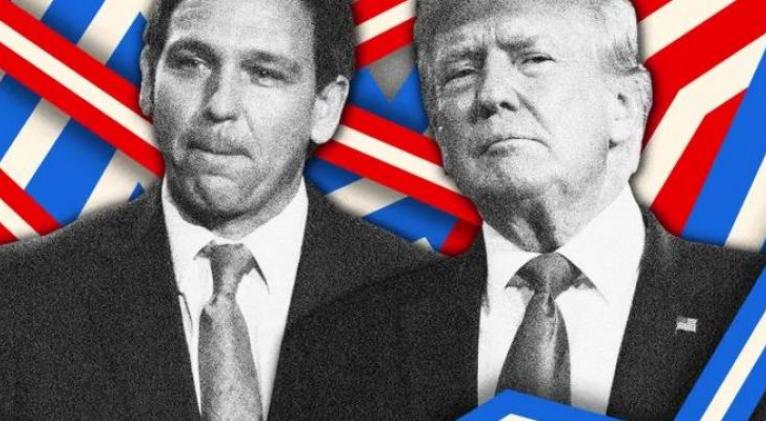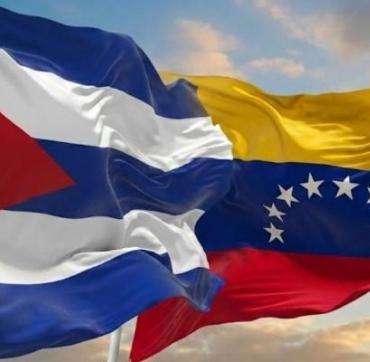#AnalyzingData: Trump's Contenders
especiales

I've been warning everyone for three weeks, but since you live at such an intense media pace and it's hard to listen, I'll repeat it once more: Donald Trump will be comfortably elected as a candidate at the Republican National Convention in Milwaukee next summer.
But, as the dramatic option that the ongoing legal processes could lead to the forced removal of the former president from this race, we should not ignore the rest of contenders. And by so doing, we may learn a little more about Trump's challengers, I do unpaid publicity for them, and I work on the article of the week. Let's get serious then.
So far, and with the campaign filing period almost over, the Republican Party has at least 10 known candidates seeking their party's nomination. They compete with Trump his former vice president Mike Pence; the governors of Florida, Ron DeSantis and from North Dakota, Doug Burgum; the former governors of New Jersey, Chris Christie —who has not held public office for more than five years— and from Arkansas, Asa Hutchinson; Nikki Haley, former ambassador to the United Nations and former governor of South Carolina; Tim Scott, U.S. Senator from South Carolina; biotech entrepreneur Vivek Ramaswamy; and conservative talk show host Larry Elder, who has already tried unsuccessfully for governor of California.

Although it seems like a long list, it could have been much longer, more than in the 2016 primaries when there were 17 applicants. And it’s that several Republicans who had expressed their intention to run have already renounced, like former Secretary of State Mike Pompeo; New Hampshire Governor Chris Sununu; former Maryland Governor Larry Hogan; Texas Senator Ted Cruz; and Arkansas Senator Tom Cotton. Other politicians like the former Secretary of Energy, Rick Perry; the mayor of Miami, Francis Suarez; and Virginia Governor Glenn Youngkin; they also don't seem determined to come forward, even when they have come forward as potential applicants.
The current list of candidates matches those of 2016 as the most racially diverse: Scott and Elder are black, while Haley and Ramaswamy have Indian roots. For Haley and Scott in particular, race plays a key role in their message to voters, though all four deny the existence of systemic racism, and generally oppose federal policies designed to help people based on the color of their skin. Republican leaders hope that diversity will help the party continue its modest gains among black and Latino voters, groups that remain overwhelmingly supportive of Democrats, but even small cracks in that coalition could be significant in 2024.
There’s only one woman among the applicants, but there’s quite a variety of ages. Trump is the oldest at 76, while Ramaswamy is the youngest at 37, followed by DeSantis at 44, while the rest are in their fifties, sixties or seventies.
Worthy Republicans at last, with few exceptions, all the candidates have embraced tough conservative policies on issues like immigration, gun violence and gender rights, and the LGBTQ community, and are opposed to a greater or lesser extent to the right to abortion, although there are differences in the level of their opposition and in their approach on the subject, which could moderate even more in the pre-election scenario without compromising actions or future positions. They also oppose introducing new limits on gun ownership, including a ban on assault rifles. Most attribute the nation's gun violence epidemic to mental health issues.
As we observed in the previous article, none of the contenders come close to Trump in the polls. By presenting his candidacy so early—seven months ago now—he was seeking to scare off his potential rivals and get himself on the electoral stage before the avalanche of legal proceedings against him. Perhaps the first did not quite succeed, but the second was a movement towards emotional springs rooted in the average American; the narrative he handled towards his electoral bases allowed him to connect with the criteria that one thing is an ordinary citizen harassed by justice "without evidence", and another is a candidate besieged by the corrupt judiciary that prevents him from returning to "make the country great". Trump shielded himself, victimized himself and worked on the emotions of solidarity in the face of an alleged injustice, to maintain a firm hold on an important part of the Republican base, which does not seem to be enthusiastic about the remaining proposals.
The variety of rivals has also formed a mathematical problem that is benefiting Trump, because he has atomized those who oppose him, but has not diminished his supporters. Even less such a variety of rivals has resulted in a variety of strategies to defeat him. On everyone’s eyes, DeSantis is his strongest rival, but he still has not outlined a consistent strategy, and above all of his own, genuine, and different from Trump's. Betting on facing him by imitating his agenda on immigration, abortion and other issues, while adopting the former president's combative style and ways, makes him nothing more than a version 2.0 of his rival.
Furthermore, DeSantis is still making his debut in national politics. Rivals from both parties are digging into his past for any hint of damaging information, and his fellow Republicans openly question his social skills. And yes, a supposed scenario without Trump could substantially alter the preferences of the Republican base, but not necessarily in favor of DeSantis.
Nor does it seem to be productive to appeal to the constant American voters attacking Trump's management and political skills, seeking to expose him as incapable and immoral. DeSantis himself, Pence, and Christie have all tried it, with no apparent results.
Another space that tends to switch trends could be the debates, due to start in August, but there’s already uncertainty that Trump has raised the possibility of not attending, given the advantage he has, while DeSantis has attacked the traditional media that would play a role in organizing those events.
Although we could assume that the primary scenario is already set, there’s still room for surprises in the coming months. In any case, for Trump's rivals, the main objective of this race seems not to be so much to win —which does not hurt anyone if they succeed— but to accumulate miles in political life, position themselves in the internal leadership of the party and become visible by 2028.
For the next article we will deal with a bit of trends between the two parties, that it’s time to see some tension on the electoral map of the United States.
Translated by Amilkal Labañino / CubaSí Translation Staff














Add new comment